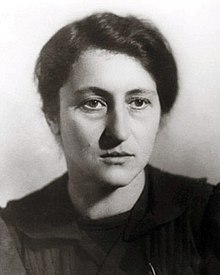Wanda Wasilewska | |
|---|---|
 | |
| Native name | |
| Born | 21 January 1905 Kraków, Austria-Hungary (now Poland) |
| Died | 29 July 1964 (aged 59) Kyiv, Ukrainian SSR, Soviet Union (now Ukraine) |
| Resting place | Baikove Cemetery, Kyiv, Ukraine |
| Pen name | Wanda Woskowska |
| Occupation | Prose writer, poet, playwright, screenwriter, editor, political activist |
| Language | Polish language |
| Nationality | Polish |
| Citizenship | Polish Soviet |
| Alma mater | Jagiellonian University |
| Genre | Novel, story |
| Literary movement | Socialist realism |
| Notable awards | Stalin Prize (3 times), Order of the Cross of Grunwald 1st. Class, Order of Lenin |
| Spouse | Roman Szymański (1925–31), Marian Bogatko (1936–40), Oleksandr Korniychuk (1940–64) |
| Children | Ewa Wasilewska (with Roman Szymański) |
Wanda Wasilewska (Polish pronunciation: [ˈvanda vaɕiˈlɛfska]), also known by her Russian name Vanda Lvovna Vasilevskaya (Russian: Ва́нда Льво́вна Василе́вская) (21 January 1905 – 29 July 1964), was a Polish and Soviet novelist and journalist and a left-wing political activist.
She was a socialist who became a devoted communist.[1] She fled the German attack on Warsaw in September 1939 and took up residence in Soviet-occupied Lviv and eventually in the Soviet Union.
She was a founding member of the Union of Polish Patriots and played an important role in the creation of the 1st Tadeusz Kościuszko Infantry Division. The division developed into the Polish People's Army and fought on the Eastern Front during World War II.
Wasilewska was a trusted consultant to Joseph Stalin, and her influence was essential to the establishment of the Polish Committee of National Liberation in July 1944 and to the formation of the Polish People's Republic.[2]